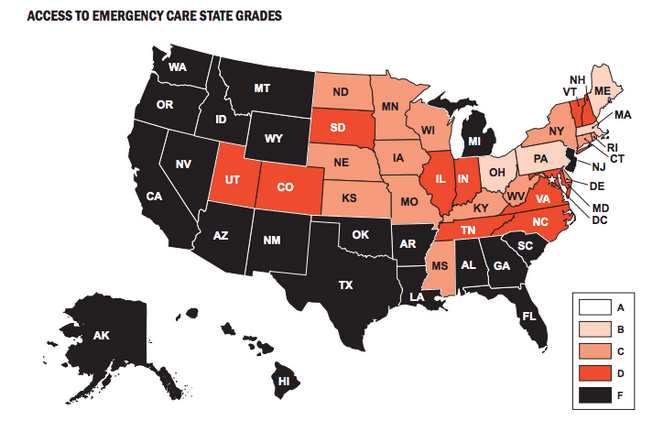States Grades on Access to Emergency Care from ACEP Emergency Care Report Card 2014
Emergency care in the United States has a lot of room for improvement, according to the latest report card from the American College of Emergency Physicians’ (ACEP).
The 2014 edition of America’s Emergency Care Environment, A State-by-State Report Card gave the U.S. an overall grade of D+ in regards to emergency care.
“The 2014 Report Card includes a wide range of indicators that represent both direct measures of emergency medical services and many indirect measures that have an important effect on the ability to provide quality and timely emergency care,” the report states.
Five categories went into the overall grade, with an individual grade given for each category. Each category represents a specific percentage of the overall grade.
Access to emergency care counted for 30 percent of the overall grade and the individual grade was a D-.
Medical liability environment and quality and patient safety environment each counted for 20 percent of the overall grade. The former got an individual grade of a C-; the latter got an individual grade of a C.
Disaster preparedness and public health and injury prevention each counted for 15 percent of the overall grade and got individual grades of C- and C, respectively.
The highest overall grade by state on the report was a B-. The states/districts who received that grade are D.C., Maine, Massachusetts and Nebraska.
The lowest overall grade on the report was an F. The only state that received that grade is Wyoming.
The report included a list of recommendations from the ACEP on how to improve emergency care in the U.S. Some of the recommendations include funding graduate programs for medical education that supports emergency care issues and using quality standards in information technology to improve patient safety.
Other recommendations related to potential healthcare changes from the Affordable Care Act.
“As more Americans become insured under the Affordable Care Act, many for the first time, emergency departments are likely to play a more pivotal role and to become more stressed,” the report says. “Measures to protect access to high-quality emergency care, such as ensuring an adequate health professional workforce and increasing hospital capacity, are essential.”









